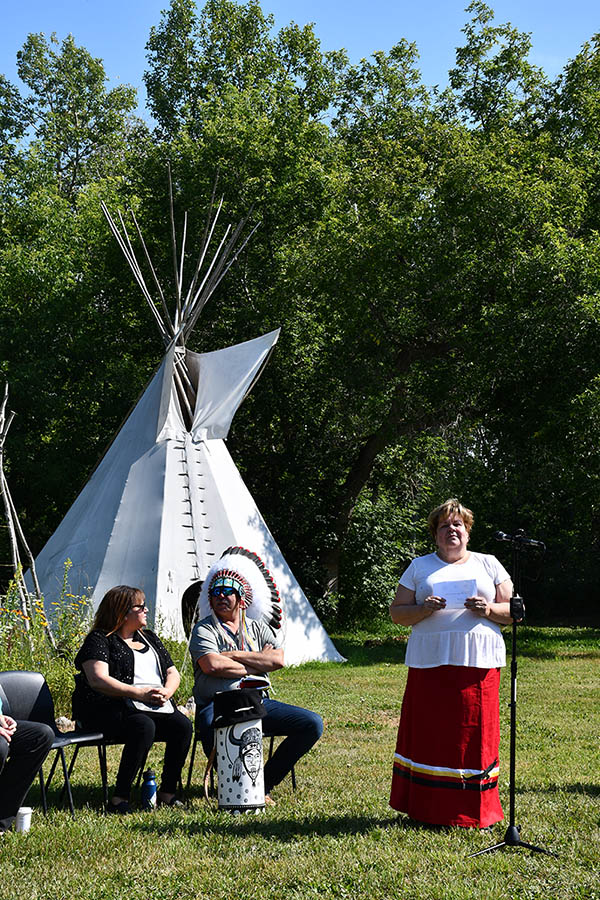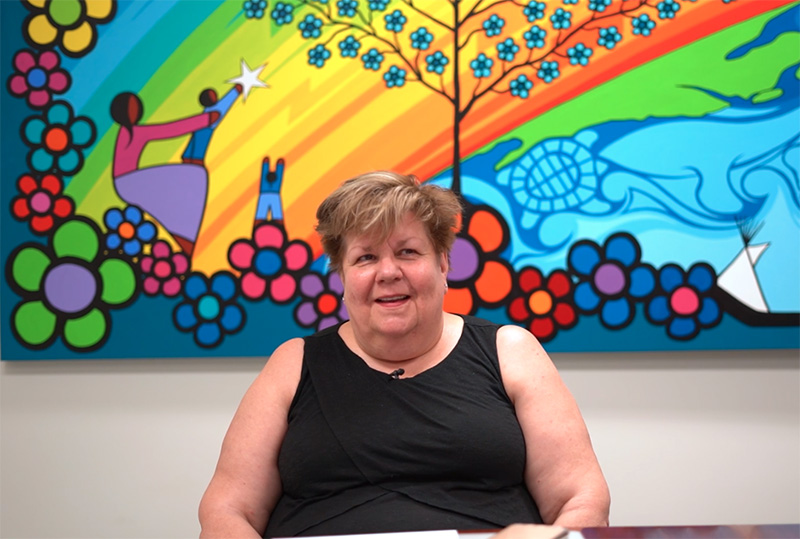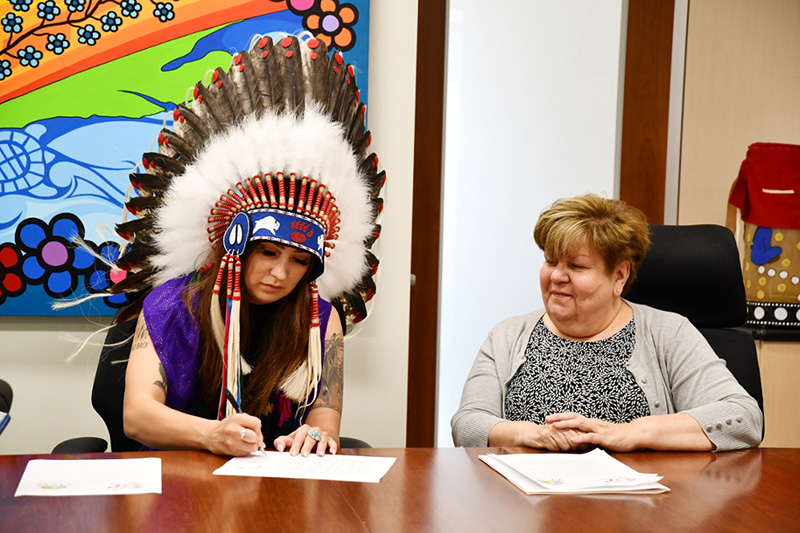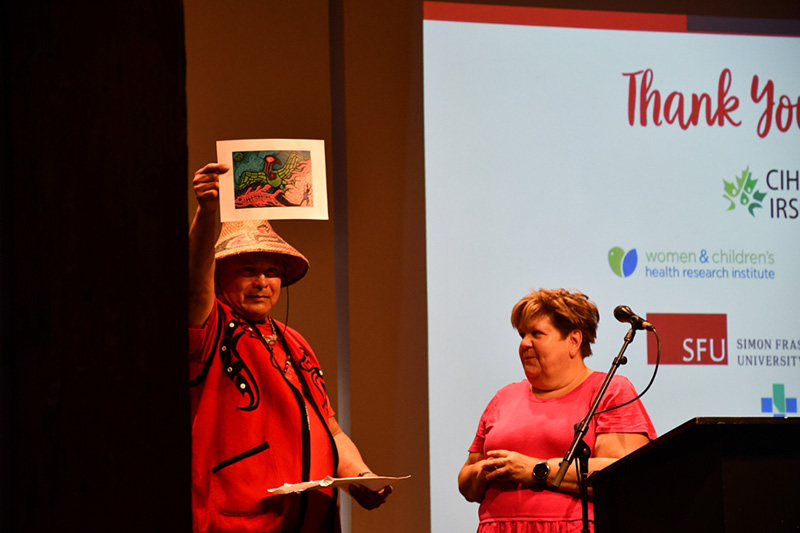Decolonizing institutional approaches to research from the inside
King is changing the way research is done with First Nations, Métis and Inuit communities
By Sarah MacDonaldDr. Alexandra King participated in a traditional Sḵwx̱wú7mesh (Squamish) canoe welcome to open the Indigenous DOHaD Gathering, which she co-chaired, in Vancouver, BC, in August 2022. The event took place on the unceded territories of the Sḵwx̱wú7mesh, Səl̓ílwətaʔ/Selilwitulh (Tsleil-Waututh) and xʷməθkʷəy̓əm (Musqueam) Nations. (Photo by Luke Heidebrecht)

When Dr. Alexandra King (MD), a citizen of Nipissing First Nation and the Cameco Chair in Indigenous Health and Wellness at USask, made a mid-life career change to become a doctor of internal medicine, it was a move motivated by a recognition that she needed to be part of the solution, to help address the health inequities faced by Indigenous people.
As King sought to overcome the wrongs faced by her own family, she realized she could also help Indigenous people more broadly. Now, as one of the most prominent Indigenous health researchers in Canada, King is changing the way research is done with First Nations, Métis and Inuit communities and decolonizing the institutional approaches from the inside.
“I thought that if I moved into Indigenous health, this could have the possibility of a lasting impact. I recognized how privileged I was, and understood the responsibility attached to that,” she said.
King, who grew up in Ottawa, was told that if she went to school, worked hard and got a good job, life would be wonderful. She realized this was not true for many Indigenous people, who faced health and socioeconomic disparities that were the lasting effects of colonialism.
To address these issues, King and her research team Pewaseskwan (the Indigenous Wellness Research Group), which she co-leads with her husband Malcolm King – a professor in community health and epidemiology -- are increasing Indigenous health research capacity and supporting Indigenous communities take leading roles in research that addresses their own needs and reflects traditional ways of knowing, being and doing. For many projects, etuaptmumk (a Two-eyed Seeing approach that brings the best of Indigenous and Western ideas) also figures prominently in improving health outcomes.

Over the past five years, her team has grown to more than 35 people who collaborate on numerous projects, sharing their expertise and building relationships with each other as well as within USask, the community and partner organizations.
The team works with many communities in Saskatchewan, Manitoba, the Inuvialuit Settlement Region and Vancouver, B.C., to develop innovative research projects that address diseases such as HIV, hepatitis C, heart disease and others, and bring land- and culture-based healing to the forefront. The projects are community-led and include ceremony and culture. King describes this as potentiating communities’ research ideas and needs and bridging the gaps between Western systems and Indigenous ways.
“We’re learning and listening. We’re figuring out how to create an ecosystem where this can happen on a larger and more sustainable scale,” she says.
Onion Lake Cree Nation (OLCN) is one of the communities that has benefitted from King and Pewaseskwan’s work. They are currently involved in two projects, Achimok, which will collect and preserve stories and knowledge from community, and Miyo-pimâtisiwin, which focuses on wellness from Indigenous perspectives. The community has strong leadership and an interest in research, but lacks the experience in navigating academic systems and grant applications, so Pewaseskwan has provided support.

"When we want to develop something…we don’t have access to funding. Since I have been connected to Malcolm and Alex, it’s just been a blessing and doors have opened. It’s a perfect partnership,” explained Dolores Pahtayken, a member of OLCN involved in the research.
Making academic institutions and systems more relatable and accessible to Indigenous people takes time, but King and Pewaseskwan are making changes. At USask, Pewaseskwan has sometimes opted to have pipe ceremonies instead of MOUs and now they are working with the legal and contracts departments to change the wording in some of the service agreements so that they adhere to the First Nations principles of ownership, control, access, and possession (OCAP) principles and other Indigenous ways of doing things.
Métis Elder and Knowledge Holder Calvin Racette, who sits on King’s management committee and who has provided ceremonial support to several of her research projects, has seen a change in way the administration at USask relates to King and other Indigenous researchers. He said King’s ability to build warm, diplomatic relationships, while simultaneously bringing in millions of research dollars, has led to systems changes that enhance the university.
“I believe they have become more opening to listening as opposed to telling us what’s good for us. Maybe it’s good timing but things happen for a reason, and I attribute that to Alexandra and her team,” said Racette.
King’s work now has national impacts. Across Canada, researchers at other institutions are learning from her how to work more collaborative with community, working with your heart and with people-centred values. Dr. Janet Jull (PhD), an assistant professor in the School of Rehabilitation Therapy at Queen’s University, who worked with Alexandra and Malcolm King in developing the Indigenous Community Research Partnerships training resource, said King has shown other researchers how to take time and space for research and to do it well by following the community’s lead.

“Without Alexandra's leadership the rest of us (researchers) could not benefit from Alexandra's potential and the outcomes of the work. That is a big advantage for academic systems, as we need time and space for Indigenous knowledges in academic settings, if things are going to change and address the inequities in our academic and social systems,” explained Jull.
King noted that sometimes she reads her own work referenced in other people’s work or hears her ideas quoted at conferences.
“When I’m hearing this coming back in different ways, I know we’re making a difference,” she said.

